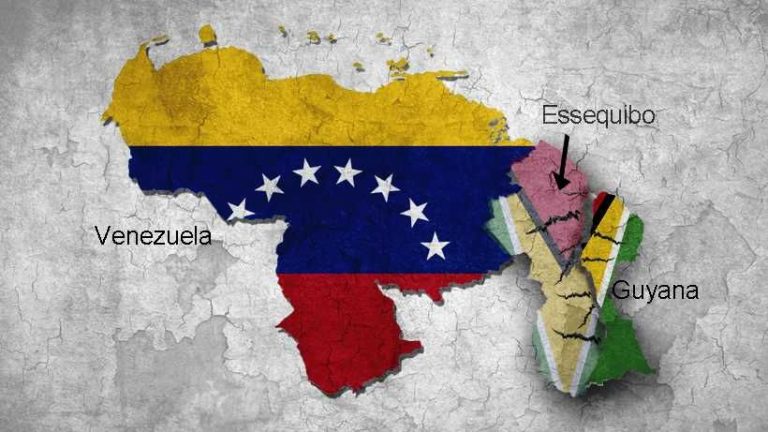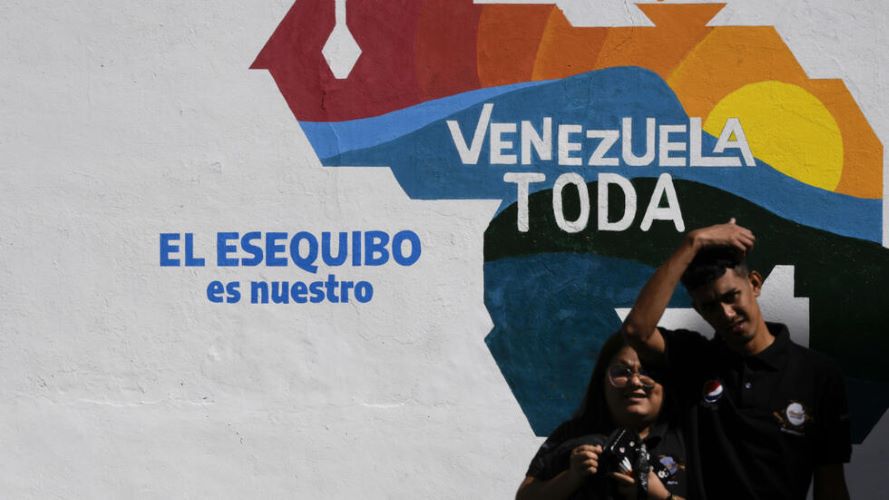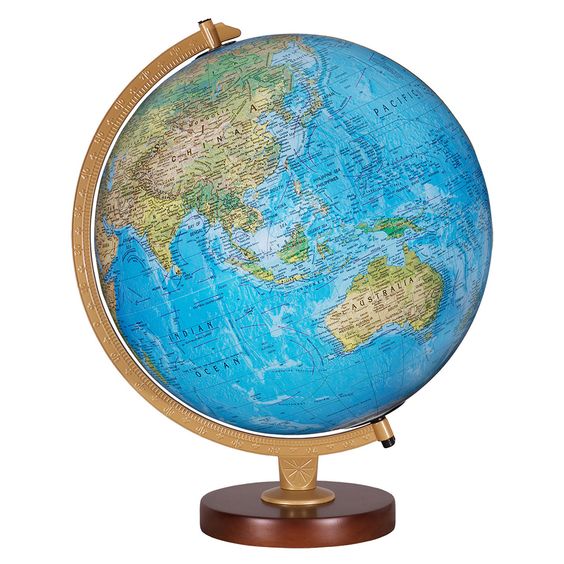
A colonial era Latin American border dispute is threatening to blow up into a major conflict
By Tom Arms
A colonial era Latin American border dispute is threatening to blow up into a major conflict involving the United States, Brazil, Venezuela, the tiny country of Guyana and possibly Britain as the former colonial power.
The catalyst is the discovery of large oil and gas deposits off the coast of the Essequibo region which is claimed by both Venezuela and Guyana. It has been occupied by Guyana since 1840.
On December 3, President Nicolas Maduro held a referendum in Venezuela in which 95 percent of those balloted voted in favour of annexing the 100,000 square mile Essequibo region which is two-thirds of Guyanese territory. It should be noted that international observers labelled the referendum “grossly unfair” and with a “low turnout”. Furthermore, no one in the Essequibo region voted.
Related report: Venezuela raises the stakes over disputed Guyana territory
International criticism, however, has not stopped Maduro from ordering foreign companies out of the jungles of Essequibo and the exclusive economic zone off the coast.
Venezuela has also mobilized its army of 100,000 in preparation for a possible invasion. Guyana has put its 7,000 troops on alert. And Brazil has sent troops to its border with Venezuela because the Venezuelan army would have to pass through Brazil to attack Guyana.
US Secretary of State Anthony Blinken has said America will protect Guyana’s sovereignty and additional US warships have been dispatched to the Caribbean for manoeuvres with Guyana’s five-boat navy.
Venezuela’s claims are currently before the International Court of Justice at The Hague which has urged President Maduro to wait for its judgment. Maduro, however, has indicated that he will not be bound by the court’s ruling.
Venezuela’s lack of faith in the judicial process is understandable. Claims pursued in that quarter have consistently failed.
The dispute goes back to 1840 when the British—then the colonial power in what was then British Guiana—employed German cartographer and surveyor Robert Hermann Schomburgyk to map the colony’s boundaries. He did so, drawing the western boundary to encompass all the land drained by the country’s main river, the Essequibo. The Venezuelans immediately disputed the “Schomburgyk Line”, claiming that the west bank of the river was Venezuelan.
As most of the territory was uninhabitable jungle, neither side pursued the claims, although Britain did settle some of the territory. But in 1876 interest was revived with the discovery of gold.
Related report: Tensions ramp up between Venezuela and Guyana over oil-rich region
The two sides agreed to submit the dispute to a five-person arbitration panel which met in Paris and in 1899 decided in favour of the British. But 50 years later, a memo emerged claiming that the British bribed or threatened the Russian chairman of the panel. Venezuela revived its claim.
This resulted in the 1962 Geneva Agreement which was effectively an agreement to disagree and talk further with the hope that the two countries would find a “peaceful, practical and satisfactory solution.” In 1966 British Guiana became the independent country of Guyana and the disputed territory became the problem of the new country.

Venezuela recognized the independent Guyana—but without the Essequibo region and in 1968 it backed a failed uprising of farmers. In 1970, Venezuela and Guyana signed a 12-year moratorium on the dispute. But when that ended Venezuela reasserted its claim. It reasserted it again when in 2011 Guyana extended its exclusive economic zone 100 miles out from the Essequibo coast.
Then in 2015 came the catalyst for the current crisis. The Guyanese government issued offshore exploration rights to Exxon. And the following year the oil giant reported large oil and gas reserves in the 10,500 square mile Stabroek Block.
The prospect of oil meant that Venezuela repeated its claims with renewed vigour. This time it agreed to let the UN refer the dispute to the International Court of Justice. The ICJ was meant to hear arguments in 2020 but the case was postponed by the covid pandemic. The court is now up, running and actively considering the case. On December 1st it warned Maduro not to act until it had issued its judgment.
 World Review
World Review
Remember Ukraine? A reminder: It is the East European country sandwiched between Russia and Poland which Russia invaded in February 2022.
You would be forgiven for letting it slip from your political consciousness. Six months ago it and its president Volodomyr Zelensky were being hailed as the “democratic shield” protecting the West from land-hungry autocratic Russia.
Now it has been pushed out of the headlines the corridors of concern by the war in Gaza and whichever crisis comes next.
The problem is that Ukraine cannot afford to slip off the front pages. It needs a successful PR campaign to stay in the war and keep the shield intact. Its armaments industry and its population are limited.
Russia’s manpower pool is four times the size of Ukraine’s. Its historic label is “steamroller.” Its armaments industry is ten times larger and was preparing years before the war started. It is also receiving weapons from Iran, North Korea and possibly China.
It is weapons that are particularly important at the moment, especially artillery shells which are used by both sides to hold the enemy at bay. Russia is estimated to have fired 22,000 rounds a day during the summer to stymie the Ukrainian counter-offensive. The Ukrainians fired 5,000 rounds.
European members of NATO promised Ukraine 1 million rounds of artillery shells by the end of 2023. It will fall well short of that target, although several European countries– including Germany, the Netherlands, Britain, Norway, Sweden, Belgium, Finland and the Baltic states—have started to increase their armaments production. However, a lot of the increased production will go towards replacing depleted national stocks.
America, is, of course, the historic “arsenal of democracy.” But President Biden’s promised support is being held up by Republican congressmen who either want to divert money to Israel or feel that Ukraine is solely a European problem.
If the defense of Ukraine is left entirely to Europe then the hard-pressed European economies will have to increase armaments production even more. At the current rate, the million promised rounds is only enough to keep the Ukrainian guns firing for another six months.
***
Britain’s Rwanda asylum issue is morphing into a constitutional crisis. At stake is the independence of the British judiciary, a long-established cornerstone of the country’s democratic foundations.
The UK Supreme Court recently threw out government plans to fly asylum seekers to the central African country of Rwanda. The basis of their decision was that the proposal was in breach of the European Convention on Human Rights, the UN Convention on Human Rights, the UN Convention on Refugees and three British acts of parliament relating to asylum seekers and refugees. Rwanda was not safe, ruled the court, because its government was likely to return asylum seekers to the country from which they had fled. This is known as refoulement.
The problem is that Prime Minister Rishi Sunak has made the flights to Rwanda the top priority of his immigration policy and immigration the top priority of his re-election campaign. The issue has also split the conservative party. Outspoken Home Secretary Suella Braverman was sacked over the issue and immediately attacked that Sunak as weak on immigration. Immigration Minister Robert Jenrick recently resigned saying that new Rwanda legislation announced this week failed to tackle the immigration problem.
The emergency legislation which caused Jenrick’s resignation is a simple Act of Parliament which declares Rwanda a “safe country” and bans any court from ruling otherwise or considering previous human rights acts.
The “safe country” claim is untrue. Rwanda has a record of returning asylum seekers to their country of origin. But that is not stopping the Sunak government from declaring that black is white and daring the court to challenge it.
The problem is that the UK Supreme Court is not as powerful as other supreme courts in the western world. It is certainly not as powerful as US Supreme Court which has the authority to overturn legislation in breach of the written US constitution.
Britain lacks the same degree of checks and balances as exists in America. Under its unwritten constitution parliament sovereignty is supreme and the court does not have the power to overturn primary legislation, which Sunak’s latest act would be.
However, the UK Supreme Court has the power to issue a “declaration of incompatibility” with existing international laws such as the European Convention on Human Rights. The declaration cannot itself stop a law being enacted. It has been used a few times since the court’s creation in 2009. Each time the government backed down because it felt that the wider issue of the independence of the judiciary was more important.
Hopefully, enough conservative MPs will think that an independent judiciary is more important than flying asylum seekers to Rwanda.
***
Italy made headlines in 2019 when it became the only G7 country to sign up to China’s Belt/Road Initiative.
It made headlines again this week when Prime Minister Giorgia Meloni said they were planning to withdraw.
Western countries generally have shied away from China’s trillion dollar global infrastructure project. They fear Chinese dominance of the global economy and the possibility of the BRI doubling as a military and political Trojan horse.
Ms. Meloni expressed similar fears this week but was possibly more concerned that the economic benefits were slanted too much in China’s favour.
Whatever the reason, Italian withdrawal from the BRI is a major blow to Beijing’s hopes and dreams. The Chinese were hoping that Italy would repeat its Renaissance role and act as an entry point for Chinese goods into the wider European market. The EU, is still the world’s largest internal market, worth about $15 trillion.
The loss of the Italian beach head comes at a bad time for the BRI and the Chinese economy in general. Sri Lanka, Kenya, Pakistan, Zambia and Tanzania have all either defaulted on loans involving the BRI are have had to renegotiate them. At the same time, the Chinese economy is struggling in the wake of the Covid pandemic and a property market crash.
***
Well, the Gaza ceasefire is over. So is the exchange of Hamas-held hostages and the release of Israeli-held Palestinian prisoners.
The Israeli bombing and fighting in Gaza has moved to the southern part of the territory where they were told to go to avoid the shelling of the northern half. In the two months since October 7, 17,000 Palestinian civilians have been killed and 46,000 wounded. This compares with 6,000 killed and 11,000 wounded in the first ten months of the Ukraine War.
The United States is showing signs of serious worry about the mounting Palestinian death rate. America’s reputation is on the line. It is Israel’s chief backer. Netanyahu’s government would be hard-pressed to survive without the $3 billion in grant aid it receives every year from US government coffers.
This week US Secretary of State Anthony Blinken made American concerns clear when he said that Washington was worried about the gap between the Israeli government’s declared intention to protect civilians and the mounting casualties.
Blinken’s concern is no surprise to any informed observer of the diplomatic scene. In the aftermath of October 7 the Biden Administration was publicly pledging full support and privately urging caution. The surprise is that the private concern has now been expressed publicly.
***
The US President’s black sheep son Hunter was this week indicted on tax charges. The new indictment is added to the previous charge of buying a gun while a crack cocaine addict.
It is alleged that Hunter failed to pay taxes of $1.7 million between 2016 and 2019. If he is found guilty he faces up to 17 years in prison.
So what now for Joe Biden’s re-election chances? His son’s shenanigans are certainly bad political news, but to date Democrats’ valiant efforts to link the president to his son’s business activities have managed only to generate volumes of innuendoes and conspiracy theories.
Republicans, however, are still rubbing their hands in glee at the black sheep’s legal difficulties. Joe, after all, prides himself on being a devoted father and family man. And Hunter’s problems are a welcome distraction from Trump’s multiple indictments on far more serious charges.
One conservative Republican emailed me this week with two possible courses of action for the president: Resign with the excuse of “family issues” or stay in office in order to pardon his son.
I replied with a third option: “Do nothing. If his son has broken the law then the president should abide by his oath of office to protect the constitution and allow the law to take its course while continuing to provide love and support as any decent father would do.”
_________________
 Tom Arms is foreign editor of Liberal Democrat Voice. He is currently updating his “Encyclopoedia of the Cold War” and co-hosts the world affairs podcast “TransAtlantic Riff” which can be heard by clicking here
Tom Arms is foreign editor of Liberal Democrat Voice. He is currently updating his “Encyclopoedia of the Cold War” and co-hosts the world affairs podcast “TransAtlantic Riff” which can be heard by clicking here
https://open.spotify.com/show/3ntjretAKNLZNFpA5ZEGDG